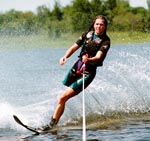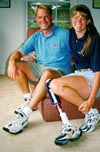Athlete conquers disability with discipline, hard work
by Dawn BrazellSpecial to The Catalyst
 Camie
Ogren practices for the nationals.
Camie
Ogren practices for the nationals.
 Camie's
medals which were won during the '98 National Disabled Championships competition
in Atlanta. During the nationals, Camie set a world record in slalom and
also a slot on the U.S. team.
Camie's
medals which were won during the '98 National Disabled Championships competition
in Atlanta. During the nationals, Camie set a world record in slalom and
also a slot on the U.S. team.
 David
Sewell, director of outreach program, Department of Physical Medicine and
Rehabilitation, and Camie Ogren.
David
Sewell, director of outreach program, Department of Physical Medicine and
Rehabilitation, and Camie Ogren.
It wasn't hairdos Camie Ogren thought about as a teenager. She had no hair.
It wasn't driving cars or dating boys or attending proms either.
It was hospital appointments, cancer chemotherapy and a possible leg amputation. At 15, Ogren had to make a decision that would affect the rest of her life. It was one of her darkest periods, she recalled. Generally an optimistic soul, Ogren had told her doctors she was strong enough to beat her cancer. After all, she was an athlete in her school. She played soccer, tennis, swam and water skied.
She knew discipline. Hard work. The power of positive thinking.
Yet here she was telling her doctor that the bone cancer, which first was detected from a tumor beneath her right knee at age 13, was back. People told her to keep the faith and not lose her winning attitude. She desperately wanted to, but couldn't ignore what she felt her body was telling her. Her doctor ran the tests and confirmed what she already knew.
Her cancer was back.
That's when she decided her leg had to go. She already had endured a painful year of rehabilitation and broken bones. Her struggle was to make sure that she made it to the next day. It was time to let doctors amputate her right leg six inches below her hip.
“I knew I would be better off without it. At some point in our lives, we're all going to be faced with a disability. Mine just happened to happen a little sooner than usual. My thing was that I was not ready to die yet. I was not ready to leave this world. I felt like I had things I needed to do. People I needed to meet. Places I needed to go.”
Ogren's hunches were right.
As a member of the U.S. Disabled Water Ski Team, she will be going to England in late August to compete in the 1999 World Disabled Championships, her fifth for the team. Her performance at the National Disabled Championships in Alabama last year earned her a world record in slalom and a slot on the U.S. team. She brought home four gold medals in the leg amputee division in slalom, trick, jump and overall best.
Ogren, 26, faces her first cold-water competition, but she knows her performance has gotten better each year. Her sun-streaked brunette hair now halfway down her back, the six-foot skier faces the upcoming trials with her old youthful optimism.
“I'm confident about the competition. I was very pleased with my performance in '97 at the worlds. I'm keeping my fingers crossed.”
A lot changed for Ogren at the '97 national competition. She met the love of her life, David H. Sewell, director of outreach programs for MUSC's Department of Physical Medicine and Rehabilitation, and learned about the university's Anchors Away, a non-profit program that gets disabled people involved with recreational activities. Ogren, who was working as a production assistant with MGM studios in her native town of Orlando, Fla., knew working with Anchors Away was what she wanted to do. With skiing boat in tow, she came to Charleston the next year to dedicate herself to helping disabled people.
Ogren said she's grateful to James Warmoth, M.D. chairman of the Department of Physical Medicine and Rehabilitation, for getting Anchors Away started. She splits her time between training for competitions and working with Anchors Away, giving presentations to community groups, doing fundraising and working one-on-one with disabled clients.
Sewell said Ogren brings so much enthusiasm to the program. When he gets discouraged that they'll not be able to raise the money, she keeps him going. She's learned to take adversity in stride. Sewell, who first was captivated by Ogren's graceful skill on the water, remembers the first time they met at a dinner after the '97 national competition. Ogren slipped on some stairs in a restaurant and her leg shot off. He was there to help her up. She just took it in stride and laughed it off. Sewell shakes his head. It's one reason he loves her so.
“What goes beyond the skiing is her ability to share what she knows,”
he said. “She inspires others. She is someone who has beat the odds.”
He also loves how she can handle a boat. Though the testing to
get a captain's license can be physically demanding, Ogren got the license.
When she sets a goal, she's dedicated, he said.
It is why she is where she is today. Two weeks after her amputation, before she even had the staples removed, she was back on the water skiing.
“It has a lot to do with determination,” she said. “It's that determination that gets you what you want because no one is going to hand it to you.”
Ogren also knows how not to take herself or her problems too seriously. She jokes about her prosthesis and how team members have to go to the “body part tent,” an area where they keep their wheelchairs, prosthesis and other aids during competitions.
“You should see people's faces when I take my leg off. ‘She's leaving body parts on the dock!’” she said, laughing.
Humor helps her not take her disability so seriously. Yes, she hates not being able to don high heels or that she has to jump rope, a part of her training regimen, on one leg. Yet there's so much she can do. Ogren's trim form knows the exhilaration of competition and of skiing 30 miles per hour spraying foam in her wake.
“It's exhilarating. I feel like I'm in another world. It's a very free feeling to being pulled behind the boat and to know it's up to you to make that buoy or complete that trick or make that jump. It's an adrenaline-pumping rush.”
Her life has been enriched by the disabled athletes she has encountered. Unlike the solitary ways of some of their able-bodied counterparts, disabled athletes depend on each other and have a deep sense of comaraderie, she said. They all find ways to help each other reach deep inside to find the strength to tackle the physical challenges of their sports.
Ogren has enjoyed recreating herself. When she had just had her leg removed, she remembers sitting and staring at where her leg was, thinking: “I'm now an amputee. Now what?”
Cancer free almost 11 years later, she has a much better idea. She now has a hard time imaging what life would be like without her amputation. Her goal now is to maintain her world championship title and set a world record in each event. “I'd like to teach everyone, whether they have a disability or not that life does go on. People with disabilities can still live lives and do what they want to do and enjoy the activities they used to enjoy. I want to put Anchors Away on the map.”
How can you help?
Camie Ogren is raising the money to cover the costs of competing at
the 1999 World Disabled Water Ski Championships in London, England.
She has received donations totaling more than half of her $7,800 goal.
Tax-deductible contributions can be sent to A.W.E. or Achieving Wheelchair Equality, earmarked Camie Ogren, water ski fund. The address is AWE, P.O. Box 525, John's Island, S.C. 29457. Put it to the attention of Gilbert Smith.
Anchors Away
Following a nationwide push to provide recreational programs for disabled
people, the faculty at MUSC's Department of Physical Medicine and Rehabilitation
developed Anchors Away in March 1995.
David H. Sewell, director for outreach programs for the department, said that he's pleased by how successful the program has become. A three-year grant from the U.S. Department of Education will run out in September, though, and the program will need more support from the community to stay afloat.
For more information, visit the program's web page at <http://www.musc.edu/AnchorsAway>
or call 792-0721.
Tax deductible contributions can be sent to 150 Ashley Avenue,
P.O. Box 250583, Charleston, 29425 or call for a list of needed donations.